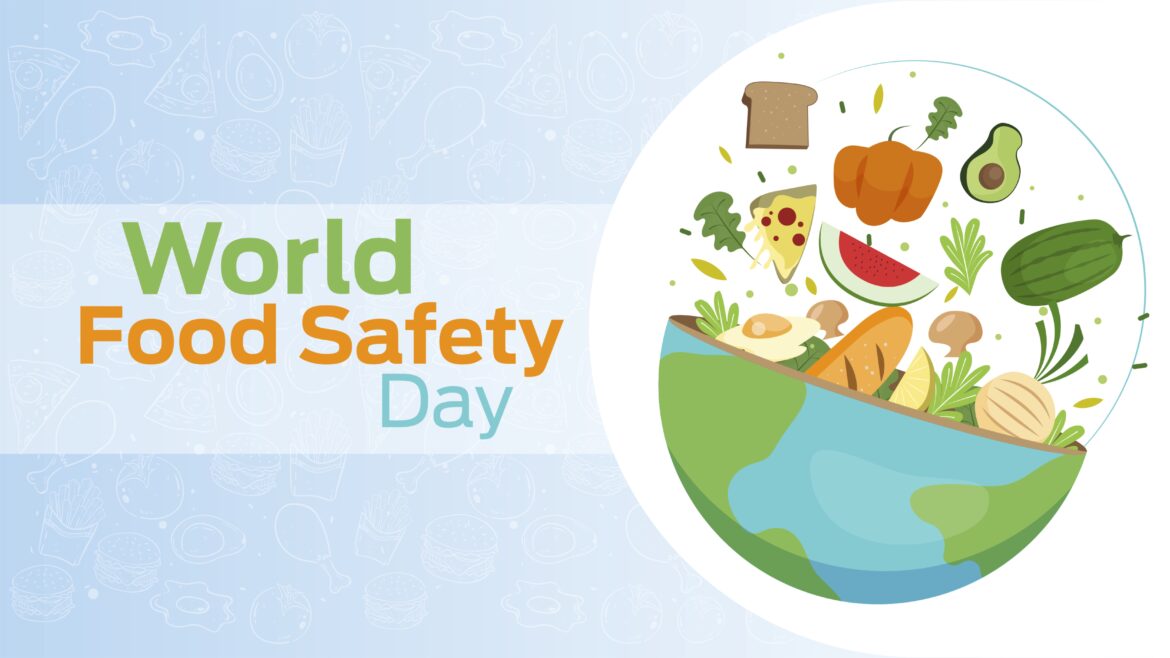World Food Safety Day 2021
World Food Safety Day (WFSD) celebrated on June 7, 2021 “aims to draw attention and inspire action to help prevent, detect and manage foodborne risks, contributing to food security, human health, economic prosperity, agriculture, market access, tourism and sustainable development.” Food safety depends on handling, packaging, and preparing foods in a manner that prevents contamination and foodborne illnesses. This is especially crucial now, as we reflect back on the COVID-19 pandemic and how it has affected our perspective on the precautionary measures we can take to ensure food safety. In light of the global pandemic, it is essential that we view food safety through a new and more informed lens.
Over the course of the past year, our mindset concerning food handling and food safety has certainly shifted. When the public was unsure how or even if COVID-19 might be transmissible via food and food packaging, many people resorted to washing their hands, their food, and food packaging to limit exposure. Since then, however, the CDC has reported that the risk of transmission of COVID-19 from food packaging and produce is very low. Still, food safety has been directly impacted by the pandemic in a variety of ways.
Food Safety at Risk: COVID-19
The pandemic both highlighted our current food safety and food handling standards and also informed the public of necessary safety measures. While the risk of transmission of the virus from food to humans has been downgraded to negligible, the CDC has reported a lower rate of foodborne illness outbreaks since the beginning of the pandemic. This phenomenon has been attributed by researchers to a heightened awareness of the importance of washing hands and sanitizing surfaces. COVID-19 safety precautions call attention to the importance of food safety measures such as hand washing and good hygiene.
While there is no evidence to prove COVID-19 is transmissible through food or food packaging, the pandemic has created a new outlook on food policy, food safety, food security, climate change, and other food-related issues. While it did not directly cause a food shortage, COVID-19 did directly affect reliable access to food for a variety of reasons. In many agricultural workplaces, including food processing and manufacturing sites, the outbreak of the virus was so severe that many employees were unable to work. In addition, there was an increased demand for food from consumers, an increase in food prices, restricted trade, closure of food production facilities, and pressure on overworked employees at risk for the virus. This resulted in a serious impact on the food supply chain and food industry. These inevitable outcomes of the pandemic have influenced research and policies pertaining to food safety and food security moving forward, specifically with relation to food production, transportation, and consumption.
World Food Safety Day 2020
One year ago, COVID-19 was the focus of WFSD. The pandemic was then in its early stages and has since influenced how we produce, handle, and market food in order to ensure the safety of human health in the future. Last year’s theme, “Food safety, everyone’s business”, reinforced the notion that everyone has the right to access safe and nutritious food and the understanding that the actions of individuals do play a role in global health. The COVID-19 pandemic serves as a reminder of the significant impacts of diseases and viruses on public health and incites action to promote future well-being.
New Era of Food Safety
The theme of this year’s WFSD is “Safe food today for a healthy tomorrow.” One lesson we have learned from this pandemic is that how we choose to approach food safety in the present has a significant impact on the future of human health. The day and theme enforce the need for sustainable food options, safe food handling, and food security in order to limit the risk of foodborne diseases. Furthermore, education and awareness of food safety risks are crucial to eliminating the potential spread of diseases and illnesses. In order to prevent risk, food must be managed safely all the way from the production source to the hands of the ultimate consumer.
On WFSD in 2021, the Pan American Health Organization (PAHO) and World Health Organization (WHO) are launching five calls to action: ensuring that governments provide safe and nutritious food; growing food sustainably (assuring safe practices from the food source); making sure business operators keep food safe; working together to enforce food safety and overall health; and encouraging access to information and knowledge relating to healthy food practices for the consumer.
Get Involved
There are many ways to participate in WFSD this year, either in person and/or virtually. In its guide to World Food Safety Day, the Food and Agriculture Organization of the United Nations (FAO) recommends hosting workshops/conferences to discuss food safety at the local level, organizing talks to demonstrate why food safety is important in communities, holding outdoor activities to encourage people to engage in physical activity, and/or using social media to promote the sharing of information on food safety knowledge.
Resources:
World Food Safety Day:
- World Food Safety Day 2021, World Health Organization (WHO)
- A Guide to World Food Safety Day 2021, Food and Agriculture Organization of the United Nations (FAO)
- World Food Safety Day – Resources, UN
Food Safety/Policy:
- Food Safety, CDC
- Food Safety Information
- Food Safety and the Coronavirus Disease 2019 (COVID-19), U.S Food and Drug Administration (FDA)
- Towards a NYC COVID-19 Food Response in 2021 – New Report, Hunter College NYC Food Policy Center


